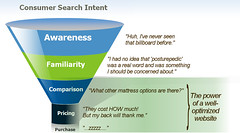 |
Then ask what bearing each of these facts has on the language you speak, write, and read. Each of these pursuits, and every activity you indulge in, has a vocabulary of its own. And one of the best ways to become truly word- conscious and to make a list of words used in each of these activities.
Don’t burden yourself with too much of the apparatus of the formal dictionary – – abbreviations, principal parts of the verbs and the like. For your purpose, a simple list of interesting words and their definitions, a glossary, is all you need. Then compare your list with those your friends make up and combine them all into one master list of your very own language
Here is an example. I have an interest in Search Engine Optimization, so here are some words that I have learned that reflects this interest:
SEM: Stands for Search Engine Marketing, and as the name implies it involves marketing services or products via search engines. SEM is divided into two main pillars: SEO and PPC. SEO stands for Search Engine Optimization, and it is the practice of optimizing websites to make their pages appear in the organic search results. PPC stands for Pay-Per-Click, and it is the practice of purchasing clicks from search engines. The clicks come from sponsored listings in the search results.
Backlink: Also called inlink or simply link, it is an hyperlink on another website pointing back to your own website. Backlinks are important for SEO because they affect directly the PageRank of any web page, influencing its search rankings.
PageRank: PageRank is an algorithm that Google uses to estimate the relative important of pages around the web. The basic idea behind the algorithm is the fact that a link from page A to page B can be seen as a vote of trust from page A to page B. The higher the number of links (weighted to their value) to a page, therefore, the higher the probability that such page is important
Anchor text: The anchor text of a backlink is the text that is clickable on the web page. Having keyword rich anchor texts help with SEO because Google will associate these keywords with the content of your website. If you have a weight loss blog, for instance, it would help your searchrankings if some of your backlinks had "weight loss" as their anchor text.
Title Tag: The title tag is literally the title of a web page, and it's one of the most important factors inside Google's search algorithm. Ideally your title tag should be unique and contain the main keywords of your page. You can see the title tag of any web page on top of the browser while navigating it.
Meta Tags: Like the title tag, meta tags are used to give search engines more information regarding the content of your pages. The meta tags are placed inside the HEAD section of your HTML code, and thus are not visible to human visitors.
SERP: Stands for Search Engine Results Page. It's basically the page you'll get when you search for a specific keyword on Google or on other search engines. The amount of search traffic your website will receive depends on the rankings it will have inside the SERP5.
Keyword Density: To find the keyword density of any particular page you just need to divide the number of times that keyword is used by the total number of words in the page. Keyword density used to be an important SEO factor, as the early algorithms placed a heavy emphasis on it. This is not the case anymore.
Web Crawler: Also called search bot or spider, it's a computer program that browses the web on behalf of search engines, trying to discover new links and new pages. This is the first step on the indexation process.
Canonical URL: Canonicalization is a process for converting data that has more than one possible representation into a "standard" canonical representation. A canonical URL, therefore, is the standard URL for accessing a specific page within your website. For instance, the canonical version of your domain might be http://www.street.com instead of http://street.com.
Get the picture?
Leave your comments below.




